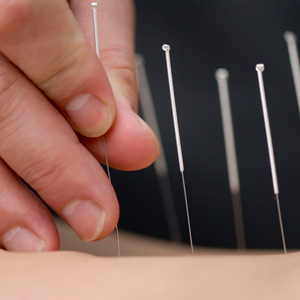Dry Needling Boston
 Dry needling (DN) is a modern, research-based treatment used to reduce pain, improve mobility, and restore optimal function in the neuromusculoskeletal system. Unlike Traditional Chinese Medicine acupuncture, dry needling is not designed to influence the flow of Qi or energy; it is based entirely on anatomy, neurology, and physiology.
Dry needling (DN) is a modern, research-based treatment used to reduce pain, improve mobility, and restore optimal function in the neuromusculoskeletal system. Unlike Traditional Chinese Medicine acupuncture, dry needling is not designed to influence the flow of Qi or energy; it is based entirely on anatomy, neurology, and physiology.
What It Is
Dry needling involves inserting a very thin monofilament needle directly into areas of tight or irritated muscle tissue, often referred to as trigger points. This stimulates a healing response by improving blood flow, releasing muscle tension, and decreasing irritation of surrounding nerves. DN can be used on its own or as part of a larger treatment plan that may include manual therapy and corrective exercise.
Who It Helps
Dry needling can be effective for many of the conditions we treat, including:
- Neck pain and headaches
- Back pain, including lumbar dysfunction
- Shoulder pain and rotator cuff injuries
- Elbow pain, including golfer’s and tennis elbow
- Wrist and hand pain, including carpal tunnel syndrome
- Hip and knee pain
- Foot and ankle conditions such as plantar fasciitis and Achilles tendinopathy
- Muscle strains, joint sprains, and sports injuries
- Sciatica and other nerve-related pain
- Chronic stiffness, muscle spasms, and postural dysfunction
What to Expect
During your session, your provider will first assess whether dry needling is appropriate for your condition. If recommended, they will insert a thin, sterile needle into the targeted tissue. You may feel a brief twitch or ache as the muscle releases. Sessions are typically combined with other treatments to address the underlying cause of your symptoms and maximize results.
Precautions
Dry needling is safe when performed by a trained provider but, like any procedure, carries some risks. Possible side effects include temporary soreness, bruising, or mild bleeding at the treatment site. Rare but more serious complications include infection or accidental puncture of a lung (pneumothorax), particularly when treating areas near the chest wall. Your provider will review your health history, explain the procedure in detail, and answer any questions before beginning treatment.
Our Expert Staff
Stephanie has completed her certificate of dry needling from the Acupuncture Foundation of Canada Institute (CAFCI) from 2007 to 2010 while practicing in a sport medicine clinic at the Olympic Stadium in Montreal, Canada. She also got her Quebec Board mandatory Recertification in 2012.
Please note: Dry Needling is just one modality used in conjunction with the variety of manual therapy techniques and prescriptive exercises, prescribed by a manual physical therapist to restore you to optimal physical function. DN is only one component of a multidimensional treatment approach, geared at creating a successful outcome for you. As a manual physical therapist, we address various neuromusculoskeletal conditions such as biomechanical muscle imbalances, postural dysfunctions, muscular flexibility limitations, strength deficits, swollen or stiff joints, and many other conditions… all of these conditions may require much more than just dry needling.
Contact Spine & Sports Injury Center to get started today.
CONTACT US »

